What is Edtech?
Edtech combines education with technology, using digital tools to improve learning. It includes everything from online courses to interactive apps and virtual classrooms. The goal is to make education more efficient and accessible by integrating technology with traditional teaching methods.
The Rise of Edtech
The top Edtech companies have brought major changes to education, making learning more interactive and personalized. This shift has created new opportunities for students and teachers alike.
How Technology Has Transformed Education
Technologies like top Edtech companies have transformed education, as:
- Interactive Learning: Traditional classrooms often rely on lectures and textbooks.Now, Edtech introduces interactive methods where students engage directly with the content through simulations and games.
- Wider Reach: With online platforms, education is no longer confined to physical classrooms. Students worldwide can access the same resources, breaking down geographical barriers.
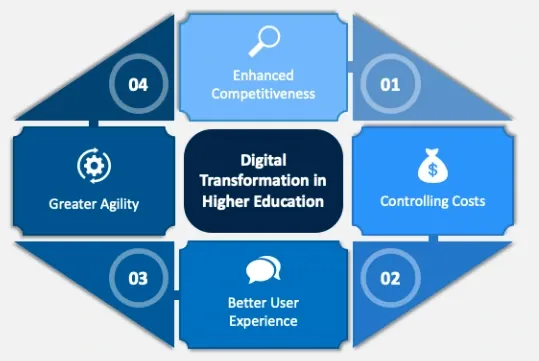
Popular Edtech Tools and Platforms
The popular and top Edtech companies are the following:
- Coursera and Khan Academy: These platforms offer courses from top universities to anyone with an internet connection, democratizing access to quality education.
- Duolingo: A language learning app that makes mastering a new language fun and interactive.
- Google Classroom: This tool helps teachers organize assignments, provide feedback, and communicate with students efficiently.
Key Benefits of Edtech
Edtech offers numerous benefits that make education more accessible, personalized, engaging, and flexible. Here’s how:
Accessibility
The first benefit of having top Edtech companies is accessibility, as:
- Global Access: Edtech provides education to people everywhere, even in remote areas. For example, a student in a small village can access top-quality courses online, which would have been impossible without technology.
- Edtech Startups: Many Edtech startups focus on reaching underserved populations, ensuring that everyone has a chance to learn.
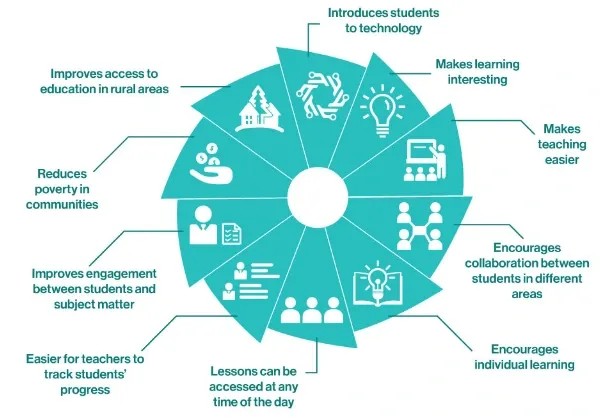
Personalization
The second benefit of having top Edtech companies is personalization, as:
- Tailored Learning: Edtech allows lessons to be customized to fit each student’s pace and interests. A student struggling with math, for example, can use apps that adjust the difficulty level to ensure they understand each concept.
- Adaptive Learning: Some platforms use AI to analyze students’ learning patterns and suggest personalized study plans, helping them learn more effectively.
Engagement
The third benefit of having top Edtech companies is engagement, as:
- Interactive Tools: Traditional teaching can sometimes be boring. Edtech introduces tools like virtual labs, where students can conduct experiments in a simulated environment, making learning more engaging.
- Gamification: Some Edtech companies use game-like elements to make learning fun, increasing students' motivation to learn.
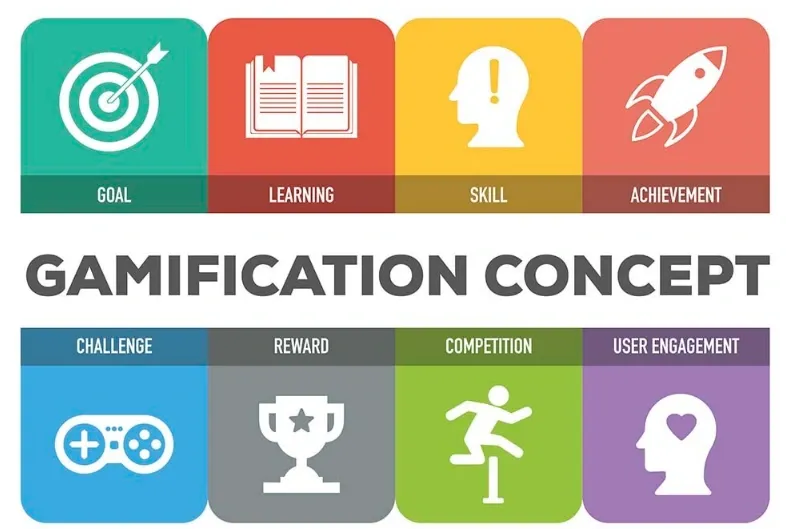
Flexibility
Another benefit of having top Edtech companies is flexibility, as:
- Learn Anytime, Anywhere: Edtech allows students to learn at their own pace and schedule. Whether it’s a busy professional taking a course after work or a student studying at night, Edtech makes learning flexible and convenient.
- Top Edtech Companies: Many of the top Edtech companies offer courses that can be accessed on-demand, fitting into the diverse schedules of learners.
Challenges in Edtech
While Edtech offers many advantages, it also faces several challenges that need to be addressed to ensure its success.
Digital Divide
The first challenge of having top Edtech companies is the digital divide, as:
- Access to Technology: Not everyone has the same access to technology. Students in low-income areas may not have the necessary devices or internet, putting them at a disadvantage. Bridging this gap is crucial for Edtech to be truly effective.
- Edtech Companies' Role: Edtech companies need to focus on creating solutions that are accessible to all, regardless of their financial situation.
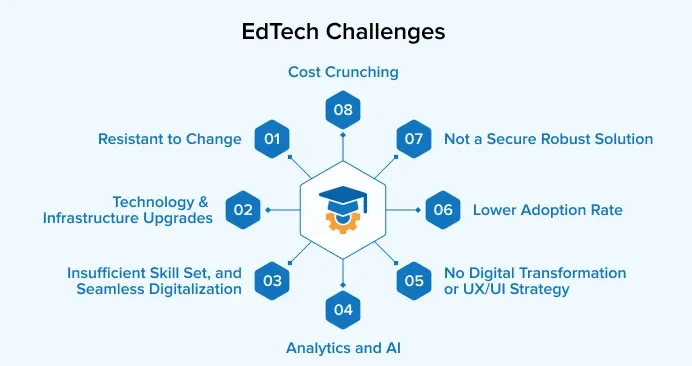
Quality Control
Next, the challenge of having top Edtech companies is quality control, as:
- Ensuring Quality Content: With the rapid growth of Edtech, not all online content meets educational standards. Students might end up using resources that are not effective, leading to gaps in their learning.
- Maintaining Standards: Edtech startups must prioritize quality, ensuring that the content they provide is reliable and educational.
Data Privacy
The third challenge of having top Edtech companies is data privacy, as:
- Protecting Student Data: As Edtech platforms collect a lot of data on students, there’s a concern about data privacy. Ensuring that this information is kept safe and not misused is a significant challenge.
- Security Measures: Edtech companies need to implement strong security protocols to protect sensitive student data from breaches.
The Future of Edtech
The future of Edtech looks promising, with exciting advancements on the horizon.
- Artificial Intelligence: AI is expected to play a bigger role in Edtech, offering more personalized learning experiences by analyzing students’ learning habits.
- Virtual Reality: VR will likely become a common tool in education, providing immersive learning experiences, such as virtual field trips or historical simulations.
- Continued Growth: As technology evolves, Edtech will continue to grow, offering new ways to learn and making education more accessible to everyone.
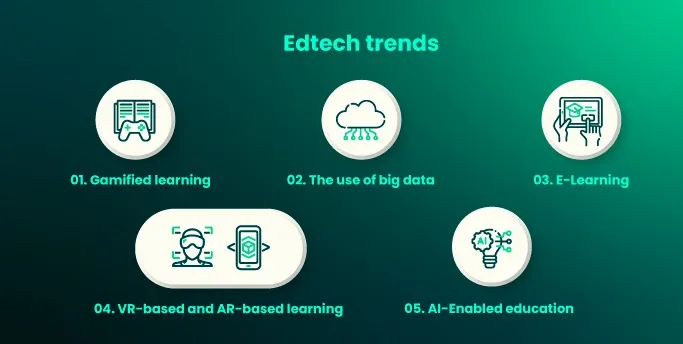
Frequently Asked Questions (FAQs)
What are the key benefits of using EdTech in classrooms?
EdTech promotes interactive learning, personalized instruction, and real-time feedback, helping students engage better and teachers efficiently track progress, resulting in improved educational outcomes.
How does EdTech support personalized learning?
EdTech allows customization of learning experiences to meet individual student needs through adaptive learning technologies, ensuring each student learns at their own pace and level.
What are some popular EdTech tools used in education today?
Popular EdTech tools include learning management systems like Google Classroom, interactive platforms like Kahoot!, and AI-driven tools like Smart Sparrow, all enhancing the learning experience.
How is AI being integrated into EdTech?
AI in EdTech personalizes learning experiences, automates grading, and provides data-driven insights for teachers, helping to create more efficient and effective educational environments.
What are the challenges faced in implementing EdTech in schools?
Challenges include ensuring equitable access to technology, providing adequate teacher training, and addressing concerns about data privacy and the effectiveness of digital learning tools.
